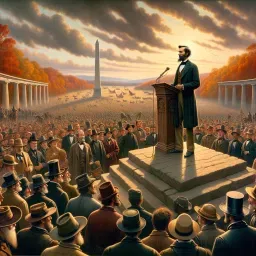It is not strange... to mistake change for progress

0
0
0
0
- Meaning
- This phrase highlights a common misconception in human experience: the belief that all changes inherently constitute progress. It cautions against the assumption that any modification or adjustment to the status quo is necessarily an improvement. True progress involves meaningful and beneficial advancements, rather than mere alterations that might not result in positive outcomes or improvements.
- Allegory
- The fork in the road represents choices and the potential for different outcomes depending on the path taken. The contrasting paths (lush and barren) symbolize progress and mere change. The thoughtful traveler symbolizes the individual's role in evaluating these choices carefully. The sky's combination of sunshine and storm clouds reflects the uncertainty and potential outcomes of change, emphasizing the need for critical thinking before embracing it as progress.
- Applicability
- In personal life, the phrase offers a valuable reminder to critically assess changes before blindly accepting them as improvements. Whether it’s adopting new technologies, altering personal habits, or making career decisions, it's prudent to evaluate whether these changes genuinely lead to personal growth or societal betterment. It encourages an analytical rather than an impulsive approach to change.
- Impact
- The impact of this phrase lies in its ability to provoke critical thinking and considerate reflection on the nature of change versus true progress. It resonates across various discussions, from technological advancements and economic reforms to social changes, reminding people to seek the underlying benefits rather than superficial modifications.
- Historical Context
- Although specific historical context linking Fillmore directly to this phrase isn't clear, the sentiment fits within the mid-19th century period of American history during which rapid changes, both technological and societal, were occurring. People at that time would often debate whether these changes were genuinely progressive or merely different.
- Criticisms
- Critics might argue that the phrase can be overly skeptical, causing hesitation in embracing new ideas and technologies. In today's fast-paced world, being overly cautious might hinder innovation and adaptability. It can also be seen as subjective; while one person's view of progress might not look like progress to another, personal biases always play a role in such judgments.
- Variations
- This sentiment is present across various cultures. For instance, in many Eastern philosophies such as Buddhism and Confucianism, the emphasis is often on whether a change aligns with the greater good or spiritual harmony, rather than viewing change as inherently valuable.
-

There's nothing left to do but get drunk.
-

I have always done my duty. I am ready to die. My only regret is for the friends I leave behind me.
-

We must adjust to changing times and still hold to unchanging principles.
-

They stumble that run fast.
-

Fourscore and seven years ago our fathers brought forth on this continent, a new nation, conceived in Liberty, and dedicated to the proposition that all men are created equal.
-

No president who performs his duties faithfully and conscientiously can have any leisure.
-

Yes we can.
-

The golden age is before us, not behind us.
-

What is right and what is practicable are two different things.
-

I contend that the strongest of all governments is that which is most free.
-

The only way to have a friend is to be one.
No Comments